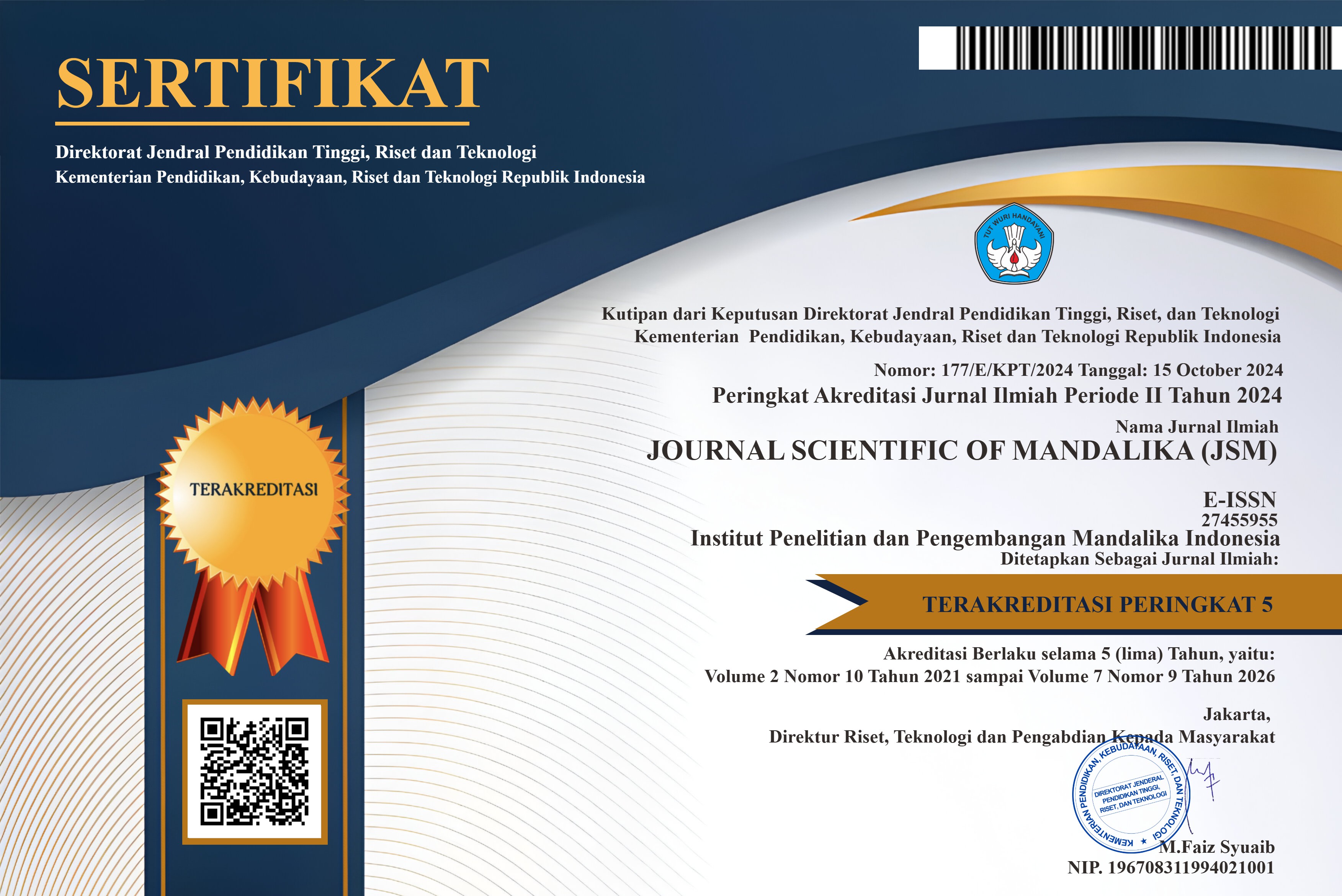Pengaruh Sistem Pengendalian Internal Pemerintah (SPIP), Kompetensi Sumber Daya Manusia, dan Moralitas Terhadap Pencegahan Kecurangan (Fraud) Pada Inspektorat Kota Bandung
Abstract
The rapid development of accounting today not only provides a positive contribution in increasing the transparency and accountability of financial reports, but also creates new risks, one of which is the increased potential for fraud. Recognizing the importance of this issue, this study was conducted to examine the factors that influence fraud prevention. Using quantitative research with descriptive and verification approaches. The data were collected through library research, field research, interviews & questionnaires to 64 respondents who were all auditors of the Bandung City Inspectorate. The sampling technique used a non-probability sampling technique with a total sampling approach, meaning the entire research population was sampled. Data analysis was carried out with the help of SPSS version 26 through a series of tests, including validity, reliability, classical assumptions, and hypothesis testing. The results show that SPIP and HR Competence have a significant impact on fraud prevention, in contrast to Morality which has no significant effect. The R-Square value obtained was 0.906 or 90.6%, which means that the independent variables play a dominant role in influencing fraud prevention, although the remaining 9.4% is influenced by external factors outside the scope of this study.
References
Arif, M. 1. (2018). Akuntansi Pemerintahan. Jakarta: Salemba Empat.
Aulia, E. A., & Syarif, D. (2024). The influence of state-owned property management, the implementation of the State-Owned Property Management Accounting Information System and human resource competency on the quality of government financial reports. eCo-Buss, 6(3), 1520-1534. https://doi.org/10.32877/eb.v6i3.1247
Ayem, S., & Kusumasari, K. F. (2020). Pengaruh Sistem Pengendalian Intern Pemerintah (SPIP) Terhadap Pencegahan Fraud dalam Pengelolaan Dana Desa dengan Akuntabilitas Sebagai Variabel Mediasi. Jurnal Ilmiah Akuntansi Dan Humanika, 10(2), 160-169. https://doi.org/10.23887/jiah.v10i2.25827
Chairi, N., Indriani, M., & Darwanis, D. (2022). Kompetensi, Moralitas Dan Sistem Whistleblowing Dalam Pencegahan Fraud: Studi Empiris Pada Organisasi Pemerintahan Indonesia. Media Riset Akuntansi, Auditing & Informasi, 22(1), 119-142. https://doi.org/10.25105/mraai.v22i1.12655
Dewi, G. A. K. R. S. (2016). Pengaruh moralitas individu dan pengendalian internal pada kecurangan akuntansi (Studi eksperimen pada Pemerintah Daerah Provinsi Bali). JIA (Jurnal Ilmiah Akuntansi), 1(1). https://doi.org/10.23887/jia.v1i1.9984
Faradiza, S. A. (2019). Fraud Pentagon Dan Kecurangan Laporan Keuangan. EkBis: Jurnal Ekonomi Dan Bisnis, 2(1), 1. https://doi.org/10.14421/EkBis.2018.2.1.1060
Fitri, A., & Nanda, N. S. (2024). Pengaruh Pengendalian Internal, Audit Internal, Moralitas Individu Dan Budaya Organisasi Terhadap Pencegahan Kecurangan (Studi Empiris Pada Inspektorat Kabupaten Kampar). Jurnal Akuntansi Kompetif, 7(2), 275-281. https://doi.org/10.35446/akuntansikompetif.v7i2.1818
Karyono. (2016). Forensic Fraud. Yogyakarta: CV. Andi
Mahmudi. (2019). Analisis Laporan Keuangan Pemerintah Daerah. Yogyakarta: Erlangga.
Nur'aini, L., & Arismutia, S. A. (2024). Pengaruh Sistem Pengendalian Internal Pemerintah, Whistleblowing System, Dan Kompetensi Sumber Daya Manusia Terhadap Pencegahan Fraud (Studi Pada Inspektorat Daerah Kota Bandung). eCo-Buss, 6 (3), 1458-1470. https://doi.org/10.32877/eb.v6i3.1200
Oktaviani, M. D., & Syarif, D. (2024). Pengaruh Sistem Informasi Akuntansi Sistem Pengendalian Internal dan Kompetensi Sumber Daya Mausia Terhadap Kualitas Laporan Keuangan pada Pusat Pengembangan Sumber Daya Manusia, Geologi Mineral dan Batubara Kota Bandung. Economic Reviews Journal, 3 (2), 1470-1487. https://doi.org/10.56709/mrj.v3i2.481
Peraturan Pemerintah Nomor 60 Tahun 2008 tentang Sistem Pengendalian Internal
Pratama, G. A., Rahmani, N. A. B., & Kusmilawaty, K. (2024). Pengaruh Penerapan Sistem Pengendalian Internal Pemerintah Dan Kompetensi Sumber Daya Manusia Terhadap Pencegahan Kasus Fraud/Kecurangan Akuntansi Dengan Pendekatan Fraud Hexagon (Studi Kasus Pada Pemerintah Provinsi Sumatera Utara). Maslahah: Jurnal Manajemen dan Ekonomi Syariah, 2(1), 49-68.
Puspitanisa, W., & Purnamasari, P. (2021). Pengaruh whistleblowing system dan kompetensi sumber daya manusia terhadap pencegahan fraud. Jurnal Riset Akuntansi, 42-46. https://doi.org/10.29313/jra.v1i1.188
Raharja, M. I., & Berliani, K. (2025). The Quality of Government Financial Reports: Factor’s That Can Affect It. eCo-Fin, 7(1), 321-333. https://doi.org/10.32877/ef.v7i1.2049
Sudarmanto, E., dkk. (2021). Sistem Pengendalian Internal. Medan: Yayasan Kita Menulis
Sunjaeni, M., & Berliani, K. (2024). The Influence of the Government's Internal Control System, Good Governance, and Organizational Commitment on Managerial Performance (In Baleendah District, Bandung Regency). https://doi.org/10.37010/jdc.v5i1.1625
Sugiyono. (2020). Metode Penelitian Kuantitatif, Kualitatif dan R&D. Bandung: Alfabeta.
Sujarweni, W (2021), Metodologi Penellitian, Pustaka Baru Press,Yogyakarta
Tarjo dan Eklamsia Sakti. (2022). Fraud Risk Management Sebuah Referensi Riset dan Praktik. Indramayu: CV. Adanu Abimata.
Yilmaz, Onurcan., Bahçekapili, Hasan G., & Sevi, Barış. (2019). Theory of MoralDevelopment. Springer Nature Switzerland AG. Yilmaz, Onurcan., Bahçekapili, Hasan G., & Sevi, Barış. (2019). Theory of Moral Development. Springer Nature Switzerland AG.
Copyright (c) 2025 Sarah Affifah Aprilianty, Kartika Berliani

This work is licensed under a Creative Commons Attribution-ShareAlike 4.0 International License.













